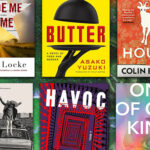Maybe the Secret to Writing is Not Writing?
Kate Angus on the Importance of Fallow Periods
For almost two years after my first book was published, I did not write a single new thing—not an essay, a story, a chapter, an ode, an elegy, nor even a monostich.
There were reasons. I was grieving the death of my dog. For 13 years, she nestled in her bed on the floor next to my desk, curled up like a furry comma, keeping me company. Now my apartment was haunted. I couldn’t sit at my computer without reflexively looking over to where she once slept—each time, seeing the bare wooden floor brought fresh tears.
I was also falling in love. Instead of sequestering myself in my apartment to work, my new boyfriend and I spent long afternoons in East River Park watching seaplanes glide down to safe landings on the bright blue water. We’d stay up all night—talking, laughing, kissing, and telling each other stories from the years before we’d met.
And I was teaching—three freshman English Composition classes, a Modern Poetry seminar and a Poetry Workshop, as well as a regular roster of private students. I spent hours laboring over lesson plans, grading essays, and editing manuscripts. I also ran a small independent press and hosted a reading series. When I finally had time to work on my own projects, I found myself bleary-eyed, too tired to concentrate.
In the past, writing had felt like pushing over the first domino at the beginning of a long intricate row—one word would tip forward, knocking another word down, and so on to the next; the words forming sentences all falling into place, and then I would resurface hours later with multiple first drafts of poems or an essay written.
Now that momentum was gone. I’d type one or two words and stop and stare at the letters. Then I’d space my cursor backwards, deleting to start again, only to hit another wall. The open document on my computer felt like a white room I was locked inside—no matter how hard I pounded at the walls or how loudly I screamed, I was trapped.
When I stood in front of my students at my lecture podium, I felt like a fraud. Who was I to comment on their tender new drafts when I wasn’t writing? How could I pretend to be an authority on a subject I no longer intuitively understood, a process I wasn’t even participating in? I used to be a writer, but now I was blocked: a failure. The best I could do was revise, tinkering with drafts I’d written in the halcyon days when I could take the inchoate feelings, ideas, and experiences that swirled like smoke inside me and alchemize them into words.
Rather than agonizing over “writer’s block,” maybe we can accept that we aren’t blocked at all, and that resting might just be part of our process.Soon I slid into a minor depression—a gray melancholia that manifested in a twenty-pound weight gain and two or three glasses of wine most nights. “I don’t know what to do,” I bewailed to my friends. “I’m trying to write and I can’t come up with anything. There’s nothing there anymore.”
For the first year, I tried to bulldoze through.
I set myself assignments, following the same exercises I gave to my students, but I hit a wall practically as soon as I began. Thinking that an outside deadline would help, I pitched an idea to a magazine editor who I then had to contact six weeks later, a few days before my article was due, to confess that I would not be turning in my piece. “I just can’t write it,” I emailed, “I’m so sorry.”
I took a TM course and dutifully meditated for twenty minutes twice a day in hopes it would unlock the gate between my creativity and my conscious self. I gave up drinking. Then I tried a stretch of drinking more, following Baudelaire’s famous advice that “You must always be drunk!”
I kicked my boyfriend out of the apartment on specified days so I could have the solitude of a writer’s retreat at home. I traveled on a fellowship to Bulgaria where all the fellows ate our meals together at a cliffside restaurant above the Black Sea and I knew every single other person at the table except for me would return to their room to write about the azure water, the Thracian ruins, the stone coffin in the local museum that held the body of a legendary local vampire, and the old women lining the dusty streets to sell us delicate lace and ripe strawberries.
By the second year, I gave up. Whenever people asked how my second book was coming along, I’d change the subject.
Then, just as easily as a cloud obscuring the sun eventually drifts past, one morning I woke up with the first lines of a poem singing in my head. I got out of bed, sat down at my desk, and began typing; within twenty minutes, I had a new poem. And then, more days than not, new work followed. I’d done nothing to lift it, but my writer’s block was gone.
It felt like a miracle, but one tinged with frustration and fear: I was cured but I didn’t know how or why the cure had happened. Since I hadn’t consciously discovered the key that unlocked the room inside me where these new poems and essays had been hiding, how could I trust that the room wouldn’t somehow lock itself up again and, the next time, what if the door never reopened?
Oddly, what saved me from spinning into terrible anxiety over the inexplicableness of my good fortune was remembering crop rotation. I grew up in the Midwest and even though my family doesn’t farm, agriculture is still enough a part of local customs that knowledge about it practically seeps in through the pores.
If you grow the same plants in the same field for too many years in a row, the soil gradually loses certain nutrients leached by the repeated crop and your harvest is at risk of being wiped out by invading insects, microorganisms, or other aggressive plants (think Irish potato famine). Ultimately, the soil can become barren. This is why astute farmers either alternate which seeds they plant in varying years so that the depleted nutrients are returned to the soil by the new crop or they let the field lie fallow so that the earth has enough time in between plantings to rest and naturally regenerate what was taken.
Another way of looking at this is to go back to Ecclesiastes, which reminds us “To every thing, there is a season,” or to the Greek philosopher Epicurus, one of the great philosophers of the Hellenistic period who espoused a kind of ethical hedonism, claiming that all human action is ultimately motivated by the goal of attaining pleasure. Epicurus is perhaps best remembered for his insistence on the primacy of pleasure, but a forthcoming book by Catherine Wilson about the Epicurean life reminds us that “there can be pleasure in not doing things.”
I live in early 21st century America and so I am by definition a cog in the capitalist machine as it grinds forward. On top of that, I make my home in New York City, where being a workaholic is often a badge of honor. Whenever I see people at parties, frequently one of the first questions posed is “What’s your latest project?” And if dare log on to any social media site, my newsfeed unscrolls a series of status updates from friends and acquaintances posting about their recent publications. It’s so easy to feel like I’m falling behind, like I should always be producing.
But this constant production is not necessarily healthy. As Jenny Odell points out in her essay “how to do nothing” (the genesis of her later book of the same name), “[i]n nature, things that grow unchecked are often parasitic or cancerous. And yet, we inhabit a culture that privileges novelty and growth over the cyclical and the regenerative. Indeed our very idea of productivity is premised on the idea of producing something new, whereas we do not tend to see maintenance and care as productive in the same way.”
But maintenance and care are necessary—without rest we cannot regenerate. These days I’ve come to believe that it’s natural for many of us to go through periods when we put words to the page and times when we can’t. These aren’t separate, distinct states; rather than agonizing over “writer’s block,” maybe we can accept that we aren’t blocked at all, and that resting might just be part of our process.
A few months ago I interviewed the poet t’ai freedom ford about her latest poetry collection, & more black, and was struck by her approach to writing. She told me, “[T]here are large swaths when I’m not actually writing, but I am doing lots of things to stimulate my muses and so I count it as writing. In that way, I don’t really believe in writer’s block, because when I consider the elements of my process, I’m most always writing (even if it’s only in my head).”
ford’s comments remind me of Epicurus, who differentiated between “nature” and “convention” in his philosophy. Epicureans believe that there are the immutable aspects of the world (nature) and there are also “perceptions, attitudes and beliefs dependent on our specifically human constitution and reflected in our categories and the words we use”—that “the sweetness of honey and the bitterness of rocket [arugula] depend on our taste receptors,” which is another way of saying that how we perceive and understand things will be shaped by our individual responses. ford can be writing even when she is not writing because of how she defines her process. Conventions are malleable because they are shaped by our attitudes towards them.
I understand my process as a field—sometimes I am harvesting and sometimes I must let the field lie fallow or seed it with other experiences so new growth can germinate.I spoke about this idea recently with my friend Shelly Oria, a writer (Indelible in the Hippocampus) and creativity coach, who said that the problem of being blocked comes up frequently with her clients. According to Oria, “Reframing writers’ block from ‘problem’ to a natural and mostly unavoidable phenomenon is almost always useful. And the reason it’s almost always useful is that it’s inherently kind. Internal conversations of blocked artists tend to be self-critical…often cruel. And that cruelty only feeds and strengthens the block…[but]…Creativity flourishes in an environment of self-kindness.”
This kindness to the self is, I think, key. If we focus on feeling blocked, marooned in isolation separate from our creative selves, it’s easy to fall into self-blame or self-hatred. We may focus on the “failure” of not generating new work instead of recognizing that during this quiet period we might be laying down the groundwork for what we will write later; we may simply need to rest and regenerate before our next project coalesces.
In the past year, I have reframed my concept of writer’s block so it is no longer a binary dialectic of either/or, where either I am writing or I am blocked, exiled from my creative practice. Instead, I understand my process as a field—sometimes I am harvesting and sometimes I must let the field lie fallow or seed it with other experiences so new growth can germinate. Even when I’m not writing in the denotative sense of inscribing words on the page, I’m still writing in a larger sense, as I am doing the necessary work of building up a storehouse of experiences, images, and ideas I will articulate later.
During those two years when I believed I was blocked, I was reading. I was traveling. I was grieving. I was falling in love. I was going to art galleries and listening to music and flying to Michigan with a new puppy for my parents and cooking chicken with 50 cloves of garlic with my sibling and drinking black coffee and falling asleep with my head on my beloved’s chest and watering the pots of aloe that line my windowsill. All that time, without realizing it, I was writing.




















